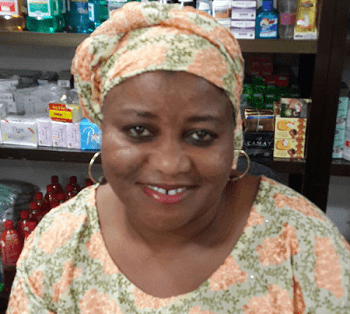 Chairman of the Association of Community Pharmacists of Nigeria (ACPN) Kaduna State, Pharm. (Mrs) Talatu Uwa Ebune, has raised alarm over what she called “improper regulation” of patent medicine vendors in the state, saying their activities are silently killing the practice
Chairman of the Association of Community Pharmacists of Nigeria (ACPN) Kaduna State, Pharm. (Mrs) Talatu Uwa Ebune, has raised alarm over what she called “improper regulation” of patent medicine vendors in the state, saying their activities are silently killing the practice
Speaking with Pharmanews in an exclusive interview recently, Pharm. Ebune, a merit award winner of the Pharmaceutical Society of Nigeria (PSN) and managing director, Nana Pharmacy and Stores Limited, equally tasked young pharmacists not to be money-driven, as pharmacy profession cannot be successfully practised without the passion to save lives. Excerpts:
Tell us about your pharmacy?
Nana Pharmacy and Stores Ltd was incorporated in July 1999 and we started business on 3 April 2000. It was great from the beginning. We started small and we grew to three branches. Nana Pharmacy has been a household name in Kaduna, by the special grace of Allah we have been able to start from a humble beginning and we are still waxing strong in terms of providing adequate community pharmacy services to Kaduna and Environs.
Looking back can you confidently say studying Pharmacy was a good decision for you?
Yes, studying Pharmacy was a good decision for me. I studied Pharmacy out of passion and love for the profession. It was love for the profession that prompted my studying Pharmacy when my last child was five years of age. Pharmacy has been everything I hoped on and I am so glad to be a point of reference for patients and customers who need to access quality and effective medications in Kaduna and environs.
What was the profession like in your early days as a young pharmacist compared to present practice?
In those days, we had utmost discipline in the profession; there was love and respect for one another. We used to be referred to as ‘’one happy family’’, largely because if you went to a neighbouring town you had a pharmacist colleague willing to offer you the needed help and care to progress.
Pharmacist nowadays are money-oriented; you hardly find that passion and motivation from the young ones these days. Yes, money is a necessary thing, but we must be more concerned about how services impact the larger society at all times.
A pharmacist is the only person legally allowed to advise and counsel patients on the best use of their medication. This alone is testament to the impact that a pharmacist has on the larger society. The younger ones should be mentored and coached to put the need of the patient above anything else. Together we can create a better future for the ones yet unborn.
At what point did you decide to vie for Kaduna State ACPN chairmanship position and what prompted the decision?
I was nominated to serve as the ACPN chairman by community pharmacists in Kaduna to foster and promote efficient and effective delivery of pharmaceutical services in Kaduna and its environs. In 2013, my opponent in the ACPN election stepped down, which adequately gave us a chance to develop in unison.
There are challenges in how community pharmacy practice was co-ordinated in Kaduna – rivalries and challenges with unqualified patent chemists. We stepped up and tried to sanitise the practice, setting a clear direction which everyone has agreed to help implement. It has been challenging but completely worth every effort that my team and I have put in.
Could you tell us some of your achievements and challenges so far as the ACPN chairman?
At the state level, we have partnered with the Pharmaceutical Society of Nigeria (PSN) in so many ways. ACPN Kaduna has been a partner to the Pharmacists Council of Nigeria (PCN) on achieving the goal of regulating patent medicine practice in Kaduna state and Nigeria as a whole.
We have also partnered with a host of Non-Governmental Organisations (NGOs), especially in commemorating and creating awareness to the public (for instance, on World Malaria Day, World Cancer Day, World AIDS day etc). We have also greatly minimised cases of register-and-go which has become a major challenge in our practice these days.
Currently we have a proper channel of drug disposal by collaborating with the Kaduna Environmental Protection Agency (KEPA) to ensure adequate disposal of expired medicines. We are always working in synergy with the National Agency for Food and Drug Administration and Control (NAFDAC), National Drug Law Enforcement Agency (NDLEA) and other drug regulatory agencies to foster better sensitisation of the public on fake and expired drugs, as well as misuse of medicines.
We have harmonised an effective way of paying taxes by partnering with GEMS-3, an NGO from the UK that helps in solving the regular problems we face while paying taxes to the government. We now have a harmonised account that makes the process adequate.
The challenges we have include: the inadequate regulation of patient medicine stores is. Presently, we have purchased a bus which is going to be used for community outreach in villages and communities to help sensitise the public and bring health care closer to the surrounding communities.
The persistent issue of register-and-go among young pharmacists, as well as getting ACPN members to attend regular bi-monthly general meetings, has been a challenge. In all this, I must admit that we are positive that the gains achieved by ACPN Kaduna will be consolidated in the long run despite the mitigating challenges.
What will you say are the greatest challenges facing community pharmacists in Kaduna at the moment?
The greatest challenge presently facing community pharmacists in Kaduna is the proliferation of uncontrolled and unmonitored patent medicine shops in open drug markets. This is silently killing community pharmacy practice in Kaduna; and it is at the expense of patients in Kaduna and its environs.
Also the various litigations against the regulatory bodies are affecting the practice of community pharmacy in Kaduna. The presence of quacks, drug abuse and misuse amongst Kaduna environs is also a challenge. The quacks handle all sorts of controlled medicines that ordinarily should not be in their disposal and this is a major setback to the profession in Kaduna.
The current economic recession is affecting all sectors and is having effects on the business sector. Is this affecting the community pharmacy sub-sector in Kaduna State? How are your members coping?
The current economic situation affects every sector of the economy as there has been a major assault on the disposable income of our customers. Restocking has been challenging for most community pharmacies and there is a major dip in the purchasing power of our patients and customers. This has largely led to the closure of some pharmacies and reduction in staff strength of major pharmacies in Kaduna.
What can you say about the happenings in the health sector in Kaduna State?
I must admit that the re-organisation of the Kaduna State Drug and Medical Supplies agency has been a success. Patients can get drugs from the State Hospital services at a reduced cost and this has promoted compliance generally from uneducated patients. There is a government commitment to the belief that effective and efficient use of medicines is a priority for all and not just pharmacists.
Improvements must be made to sustain what has been achieved. The government should involve all the key stakeholders, so as to promote a culture of inclusion in the health sector.











generic drugs without doctor’s prescription: https://genericwdp.com/ buy prescription drugs
tadalafil: http://tadalafilonline20.com/ buy tadalafil us